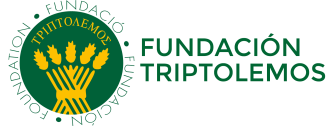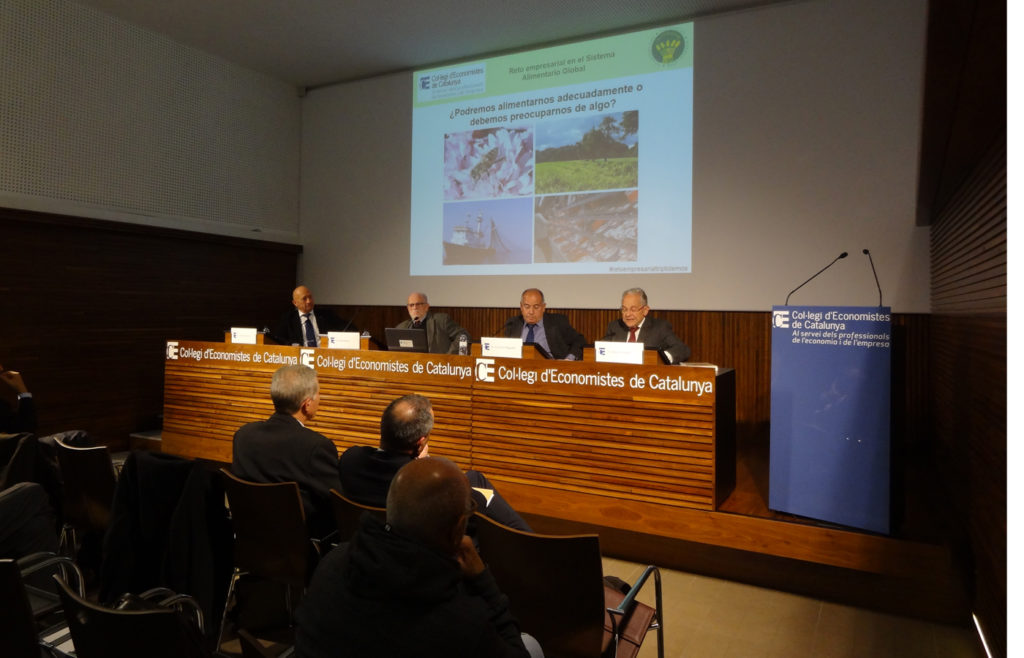BUSINESS CHALLENGE IN THE GLOBAL FOOD SYSTEM
On Tuesday, November 28, the day was held around the “Business Challenge in the Global Food System” organized by the College of Economists and Triptolemos Foundation and that featured outstanding academic and business speakers.
The act of the PROGRAM was opened by the dean of the economists’ college, and some thought-provoking interventions followed on the question: “Can we feed ourselves properly or do we have to worry about something?”, On the one hand by the group of 40 authors who have participated in the book “The Food System: Globalization, sustainability, security and food culture” coordinated by the Triptolemos Foundation and edited by Thomson Reuters, which outlines in 27 chapters the challenges and the technological and emotional complexity of the Global Food System, with a polyhedral approach .
The dean referred to the fact that the economy helps to organize the available resources at the service of the population, and that in the global situation of inequalities in the face of food availability, economists feel challenged. He was followed by José Arcas, who referred to the mission of Fundación Triptolemos around the Food System and the key role of companies.
The Food System is influenced by many more variables than other traditional sectors: limitation of resources (water, land, …), geostrategic variables, unpredictable climatic influences, economy ……. and sociological variables that are accentuated in the group of processed products. In addition to these uncertainties, the effects of ideological ideas about food and health are often placed outside the results of proven science. This environment configures a situation that presents a challenge to the Company in all its aspects, and to the business environment at the service of it.
Francesc Reguant analyzed the scenario of the XXI Century, the tension between needs and resources and the consequences that are generated (migratory currents, wars, market volatility …), and put on the table solutions based on sustainable intensification and emphasizing on the importance of attitudes of responsibility, cooperation, solidarity and flexibility.
Professor Abel Mariné sent interesting messages and documented with multiple examples around the need to innovate in our diet based on normal foods, that food has never been as safe as now but highlighted the difficulty that society has in general accept this demonstrable reality, and attributed the cause to the large non-scientific information that circulates, which causes more emotional than rational attitudes, to the detriment of the consumer.
Professor Jarauta presented the Triptolemos Index, which with a pioneering approach is a quantitative instrument of the global food system model developed by the Foundation, which allows to know the evolution, correlation and prospective of the parameters of the Food System defined from the availability (production, trends in consumption and nutrition, economic, policy (international trade, legislation ..) to cultural (gastronomy, training, behavior …) He presented with examples of 12 parameters in four countries.
The act continued with the interventions around “Challenges and responsibility of the food activity in the formation of criteria on health, safety and sustainability to the citizenship: Business effects”.
Ramon Berengueras, BETARA General Director, explained the trajectory of a small company, linked to the territory, sustainability and quality, which in a few years has become the most awarded Catalan cheese factory in the world and highlighted the importance of differentiating its products, since “the population looks for food as a way to obtain health and satisfaction”.
Josep Pont CEO of International BORGES GROUP focused his intervention on two axes: the obsession with quality, which today the correct protocols permit, and the food safety of their products and denounced the legal insecurity suffered by companies. He argued with examples of olive oil and the problems of objectivity involved in the organoleptic evaluation of the panels.
Jordi Aymerich, Head of Safety and Sustainability NESTLÉ Spain commented on his company’s effort to integrate the global food concept by working not only for the correct nutrition (health) but also for the satisfaction of its products throughout a lifetime. Idea that also generates between its creative and productive areas to elaborate products with this purpose.
At the end of the event an interesting debate was opened with the participation of the attendees, in which he highlighted the need to generate correct communication channels based on rationality and science in a subject as basic as the availability of food for proper nutrition , only for all but also with security and confidence for the citizen. This is the line with which Fundación Triptolemos is committed.
The event was closed by thanking the speakers and attendees for their presence and inviting them to enjoy an aperitif by courtesy of the participating companies.
Photo Gallery[vc_row row_type=”row” use_row_as_full_screen_section=”no” type=”full_width” angled_section=”no” text_align=”left” background_image_as_pattern=”without_pattern” css_animation=””][vc_column][vc_gallery type=”image_grid” images=”21766,21743,21764,21767,21763,21762,21759,21756,21758,21765,21757,21754,21753,21760,21761″ img_size=”medium” column_number=”5″ grayscale=”no” images_space=”gallery_with_space”][/vc_column][/vc_row]


